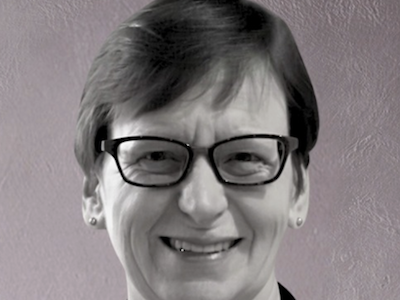
Kristen Pue
Kristen Pue is a Policy Analyst in the department of Employment and Social Development Canada. She spoke to PANL Perspectives about her research when she was a post-doctoral fellow at Carleton University (after a PhD in Political Science in 2021). Her comments and findings here don’t reflect the views of the ESDC. Her post-doc paper with Anna Kopec, titled “Do Service-Providing Nonprofits Contribute to Democratic Inclusion? Analyzing Democracy Promotion by Canadian Homeless Shelters,” was published in 2023 in the Canadian Journal of Nonprofit and Social Economy Research.
Question: How did you come to research democracy-promoting activities in our sector?
Kristen Pue: The paper came out of research in Carleton’s School of Public Policy and Administration (SPPA) and was an extension of my PhD dissertation, which had looked at how governments acquire nonprofit organizations’ public services. The literature tends to divide nonprofits into two categories: (1) nonprofits that deliver social services and services that alleviate the symptoms of poverty; and (2) nonprofits that campaign, or promote democracy, or fulfill associational functions. But it struck me that, for organizations that are frontline service providers that serve some of our most vulnerable populations, like the unhoused, the potential to do both could be a powerful force for egalitarian democracy — and it didn’t seem like there was much research that put those two together.

Anna Kopec, Assistant Professor in the School of Public Policy and Administration
My co-author, Anna Kopec, has a robust depth of knowledge about homelessness, and she and I wanted to understand to what extent service providers are providing democracy-promoting functions that we think are important about civil society and to what extent are they just focused on being homeless shelters that provide services and nothing beyond that. That was the idea behind the paper.
Q: What were the findings of the paper?
Pue: We found is that a lot of homeless shelters are involved in democracy-promoting functions in three areas. The first area promotes political participation — activities like acting as a polling station during an election or providing information about when an election occurs. The second category is what we call internal, democratic governance, such as having procedures within the nonprofit itself that incorporate participatory democracy — things like having meetings that involve clients, so that they can provide feedback. The third category is representative voice, which is about advocacy. So, for example, to what extent are homeless shelters acting as their clients’ representatives to governments and advocating for their clients’ needs? Also, to what extent are they including people with lived experiences directly in that advocacy?
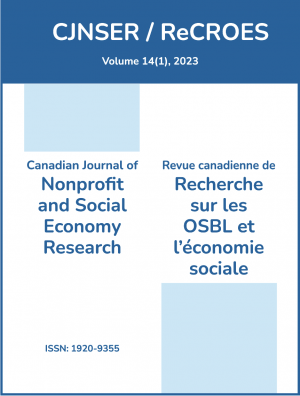 With all three of those buckets, we found that homeless shelters in Canada are undertaking those roles. We also identified, in the paper, that there’s room for further action, but I was surprised, in a positive way, by the extent to which these organizations are advocating to address the root causes of homelessness — to prevent homelessness, to support inclusion, and to do other activities that would lead to the organization becoming obsolete. To me, this is great, because if you have a justice-promoting organization, it should be okay with solving the bigger problems and becoming obsolete.
With all three of those buckets, we found that homeless shelters in Canada are undertaking those roles. We also identified, in the paper, that there’s room for further action, but I was surprised, in a positive way, by the extent to which these organizations are advocating to address the root causes of homelessness — to prevent homelessness, to support inclusion, and to do other activities that would lead to the organization becoming obsolete. To me, this is great, because if you have a justice-promoting organization, it should be okay with solving the bigger problems and becoming obsolete.
Q: Globally, how does Canada compare in terms of housing and homelessness?
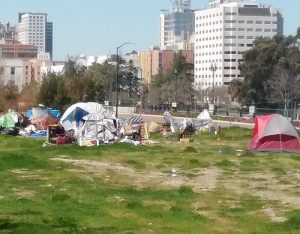 Pue: As a supplier of affordable housing, Canada lags behind other countries. We’re an outlier not only in terms of the typical comparators, like Sweden and Norway, but also compared to the UK and US, both of whom have more social housing, per capita, than Canada has. If you’re relying only on market housing, you’re never going to provide enough affordable housing for low-income people. If I were to put priority anywhere, it would be in social housing, as well as providing supportive housing for people who might need a hand because they aren’t able to pay over the short term.
Pue: As a supplier of affordable housing, Canada lags behind other countries. We’re an outlier not only in terms of the typical comparators, like Sweden and Norway, but also compared to the UK and US, both of whom have more social housing, per capita, than Canada has. If you’re relying only on market housing, you’re never going to provide enough affordable housing for low-income people. If I were to put priority anywhere, it would be in social housing, as well as providing supportive housing for people who might need a hand because they aren’t able to pay over the short term.
A cascading series of problems, like climate change, the housing crisis and inflation, is resulting in more people who have full-time jobs still not being able to sustain the means of life. That makes the pathways out of homelessness a lot more challenging — and we may see things get worse if effort isn’t put into addressing underlying problems. Really, the solution isn’t complicated: you house people in affordable housing.
Q: During the research related to housing and homelessness, were there any democracy-promoting activities that stood out?
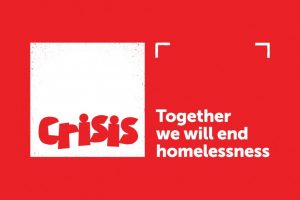 Pue: The work of Crisis, in the UK, got me excited. The way they frame the role of the people they serve — referring to them as “members” rather than “service users” and “clients” for instance — is inclusive and highlights what we want, ideally, in terms of the relationship between members and shelters. They’re members who have rights and agency.
Pue: The work of Crisis, in the UK, got me excited. The way they frame the role of the people they serve — referring to them as “members” rather than “service users” and “clients” for instance — is inclusive and highlights what we want, ideally, in terms of the relationship between members and shelters. They’re members who have rights and agency.

Medicine Hat, AB
Also, Medicine Hat, in Alberta, successfully ended homelessness, although I’m not sure if they’ve been able to sustain that. They took a housing-first approach because there was adequate political will. A housing-first approach seems to be the most effective approach in that you house somebody first and you don’t worry about the underlying causes of their homelessness, because meeting that basic need gives them a lot more space to be able to deal with whatever other problems that are in their life.
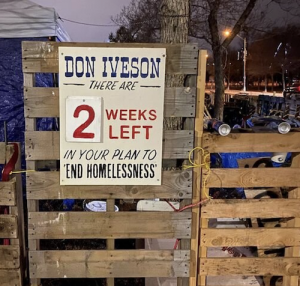
Camp Pekiwewin
And there have been a couple of social movements that have popped up in Canada that have been helpful in promoting democracy and participation among the unhoused.
An example was Camp Pekiwewin, a tent city in Edmonton. They were shut down, but for a considerable time (three months), they were a promising space for cross-class, political engagement in which you had social-justice organizers and unhoused populations in an environment where needs were being met.
Tent cities are a sign of a problem, but in an absence of affordable housing, that was a space where people were able to show their cross-class solidarity — and people were able to interact with one another in a way that promoted class consciousness and promoted a sense of agency that’s often lacking when you’re talking about marginalized populations.
I do think that democracy-promoting initiatives like that are helpful, and nonprofits can play a role in supporting them, because the volunteers and staff of those organizations are oftentimes the people who go to those initiatives — and the nonprofits themselves could have a more formal role.
Kristen Pue is on LinkedIn. Anna Kopec is on LinkedIn as well.
Sign up for PANL Perspectives' free monthly newsletter
Monday, August 28, 2023 in Closer Takes, For homepage, News & Events, Public Policy & Advocacy, Research from Alumni, Shifting Power
Share: Twitter, Facebook


